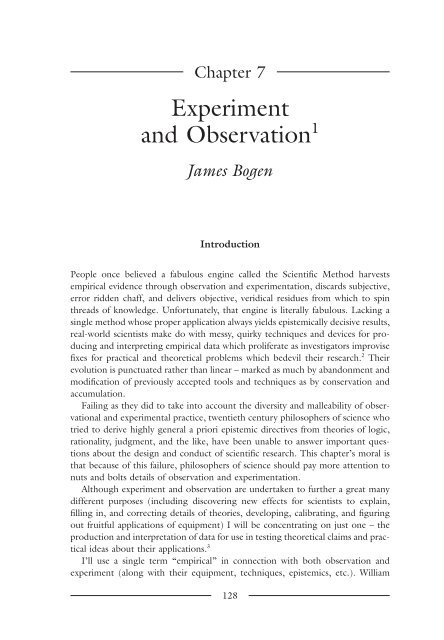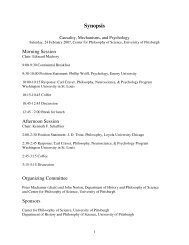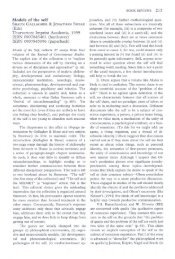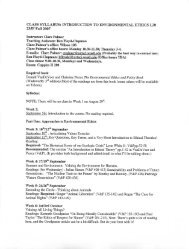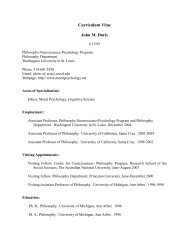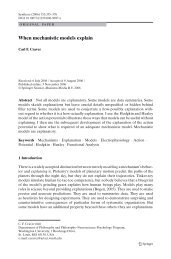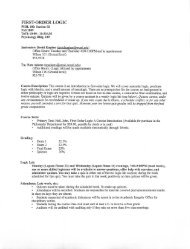- Page 1 and 2:
The Blackwell Guide to the Philosop
- Page 3 and 4:
The Blackwell Guide to the Philosop
- Page 5 and 6:
Contents Notes on Contributors vii
- Page 7 and 8:
Notes on Contributors Daniela M. Ba
- Page 9 and 10:
Notes on Contributors Peter Machame
- Page 11 and 12:
Preface of science and again about
- Page 13 and 14:
Peter Machamer until the present da
- Page 15 and 16:
So, formally, what was needed was a
- Page 17 and 18:
Peter Machamer work out and change
- Page 19 and 20:
Peter Machamer general, trans-parad
- Page 21 and 22:
Peter Machamer or general relativit
- Page 23 and 24:
Peter Machamer actually know some o
- Page 25 and 26:
Peter Machamer General strike and r
- Page 27 and 28:
Peter Machamer 1940 Journal of Unif
- Page 29 and 30:
Chapter 2 Philosophy of Science: Cl
- Page 31 and 32:
John Worrall the view): the “revo
- Page 33 and 34:
John Worrall Confirmation - the att
- Page 35 and 36:
John Worrall Confirmation - the Bay
- Page 37 and 38:
John Worrall Virtues like these, co
- Page 39 and 40:
John Worrall Creationism (C) - say
- Page 41 and 42:
John Worrall Then, of course, as pa
- Page 43 and 44:
John Worrall and about the vibratio
- Page 45 and 46:
John Worrall A different view - a v
- Page 47 and 48:
John Worrall Lakatos, I. (1970):
- Page 49 and 50:
Jim Woodward account are complex, b
- Page 51 and 52:
Jim Woodward a DN explanation answe
- Page 53 and 54:
Jim Woodward plete: the occurrence
- Page 55 and 56:
Jim Woodward The Causal Mechanical
- Page 57 and 58:
Jim Woodward appeals to the general
- Page 59 and 60:
Jim Woodward use of a single origin
- Page 61 and 62:
Jim Woodward of the limitations of
- Page 63 and 64:
Jim Woodward a relatively sharp dis
- Page 65 and 66:
Jim Woodward Hitchcock, C. (2001):
- Page 67 and 68:
Logical and extralogical vocabulary
- Page 69 and 70:
Carl F. Craver world - a picture in
- Page 71 and 72:
Hairpin turn Na+ 3. Hairpins bend i
- Page 73 and 74:
Carl F. Craver Theories and laws A
- Page 75 and 76:
Carl F. Craver that the required ph
- Page 77 and 78:
Carl F. Craver to take on the allow
- Page 79 and 80:
Carl F. Craver provides important r
- Page 81 and 82:
Carl F. Craver tion that the lower-
- Page 83 and 84:
Carl F. Craver attention to salient
- Page 85 and 86:
Carl F. Craver 3 Classic statements
- Page 87 and 88: Carl F. Craver Bechtel, W. and Rich
- Page 89 and 90: Carl F. Craver Nagel, E. (1961): Th
- Page 91 and 92: Chapter 5 Reduction, Emergence and
- Page 93 and 94: Michael Silberstein The Varieties o
- Page 95 and 96: Michael Silberstein Nomological sup
- Page 97 and 98: Michael Silberstein statistical mec
- Page 99 and 100: Michael Silberstein Semantic/model-
- Page 101 and 102: Ontological relations are objective
- Page 103 and 104: Michael Silberstein epistemological
- Page 105 and 106: Michael Silberstein Focus on actual
- Page 107 and 108: statistical mechanics. As of yet, f
- Page 109 and 110: Michael Silberstein as the quantum
- Page 111 and 112: Michael Silberstein limited to the
- Page 113 and 114: Michael Silberstein Humphreys sugge
- Page 115 and 116: Michael Silberstein property with a
- Page 117 and 118: Michael Silberstein Healey, R. A. (
- Page 119 and 120: Chapter 6 Models, Metaphors and Ana
- Page 121 and 122: Daniela M. Bailer-Jones Bailer-Jone
- Page 123 and 124: Daniela M. Bailer-Jones this “[a]
- Page 125 and 126: Daniela M. Bailer-Jones importance
- Page 127 and 128: Daniela M. Bailer-Jones excited sta
- Page 129 and 130: Daniela M. Bailer-Jones the science
- Page 131 and 132: Daniela M. Bailer-Jones Coping with
- Page 133 and 134: Daniela M. Bailer-Jones and elsewhe
- Page 135 and 136: Daniela M. Bailer-Jones The relatio
- Page 137: Daniela M. Bailer-Jones Bradie, M.
- Page 141 and 142: James Bogen nected causally or only
- Page 143 and 144: James Bogen Whewell (1991) and Duhe
- Page 145 and 146: James Bogen with air pressure oscil
- Page 147 and 148: James Bogen chosen for them, I’ll
- Page 149 and 150: James Bogen 1987, pp. 180-97). Gali
- Page 151 and 152: James Bogen cal significance of Mil
- Page 153 and 154: on the treatment of a low-level pro
- Page 155 and 156: James Bogen tory system. fMRI calcu
- Page 157 and 158: James Bogen Dear, P. (1995): Discip
- Page 159 and 160: James Bogen Stuewer, R. H. (1985):
- Page 161 and 162: Alan Hájek and Ned Hall The streng
- Page 163 and 164: Alan Hájek and Ned Hall Billy.) Ra
- Page 165 and 166: Alan Hájek and Ned Hall abilistic
- Page 167 and 168: with colored balls; let the languag
- Page 169 and 170: PX ( Y) PXY ( )= PY ( ) provided P(
- Page 171 and 172: Alan Hájek and Ned Hall the only t
- Page 173 and 174: The Subjectivist Interpretation: Or
- Page 175 and 176: Unorthodox Bayesianism Each of B1-B
- Page 177 and 178: Alan Hájek and Ned Hall Non-Kolmog
- Page 179 and 180: Alan Hájek and Ned Hall for a trea
- Page 181 and 182: Alan Hájek and Ned Hall Statistics
- Page 183 and 184: Alan Hájek and Ned Hall Schervish,
- Page 185 and 186: Craig Callender and Carl Hoefer His
- Page 187 and 188: Outside the Hole: h* = Identity, no
- Page 189 and 190:
Craig Callender and Carl Hoefer If
- Page 191 and 192:
Craig Callender and Carl Hoefer Of
- Page 193 and 194:
Craig Callender and Carl Hoefer the
- Page 195 and 196:
Craig Callender and Carl Hoefer In
- Page 197 and 198:
Craig Callender and Carl Hoefer its
- Page 199 and 200:
Craig Callender and Carl Hoefer i.e
- Page 201 and 202:
Craig Callender and Carl Hoefer is
- Page 203 and 204:
Figure 9.3 Our past light cone Figu
- Page 205 and 206:
Craig Callender and Carl Hoefer gen
- Page 207 and 208:
Craig Callender and Carl Hoefer But
- Page 209 and 210:
Craig Callender and Carl Hoefer Tel
- Page 211 and 212:
Laura Ruetsche ing to it. In quantu
- Page 213 and 214:
Laura Ruetsche Measuring sˆ x on s
- Page 215 and 216:
For the purposes of probing localit
- Page 217 and 218:
By the Spectrum rule [Î] = 1 and [
- Page 219 and 220:
1989). What’s more, the assumptio
- Page 221 and 222:
The revisions that require the leas
- Page 223 and 224:
Laura Ruetsche 1 i x ,..., x N x˙
- Page 225 and 226:
the apparatus system after measurem
- Page 227 and 228:
Laura Ruetsche But the terms of rec
- Page 229 and 230:
observables in {A(O)}. If it were a
- Page 231 and 232:
Laura Ruetsche particle notions. Ev
- Page 233 and 234:
Laura Ruetsche intrinsic angular mo
- Page 235 and 236:
Laura Ruetsche Bohr, N. (1935): “
- Page 237 and 238:
Laura Ruetsche Rovelli, C. (1997):
- Page 239 and 240:
Roberta L. Millstein the lenses of
- Page 241 and 242:
Roberta L. Millstein Second, if ran
- Page 243 and 244:
Roberta L. Millstein conception of
- Page 245 and 246:
Roberta L. Millstein tionary psycho
- Page 247 and 248:
Roberta L. Millstein viduals. This
- Page 249 and 250:
Roberta L. Millstein Recently, the
- Page 251 and 252:
Roberta L. Millstein described the
- Page 253 and 254:
Roberta L. Millstein However, this
- Page 255 and 256:
Roberta L. Millstein heart, and yet
- Page 257 and 258:
Roberta L. Millstein Pittsburgh-Kon
- Page 259 and 260:
Roberta L. Millstein Harding, S. (1
- Page 261 and 262:
Roberta L. Millstein of Fitness,”
- Page 263 and 264:
Chapter 12 Molecular and Developmen
- Page 265 and 266:
Paul Griffiths complex plus other r
- Page 267 and 268:
Figure 12.1 Canalization of develop
- Page 269 and 270:
Paul Griffiths Peter Godfrey-Smith
- Page 271 and 272:
Paul Griffiths development in a rad
- Page 273 and 274:
Paul Griffiths study of development
- Page 275 and 276:
Paul Griffiths of DNA “which segr
- Page 277 and 278:
Paul Griffiths empirically integrat
- Page 279 and 280:
Paul Griffiths D. Mundici and J. va
- Page 281 and 282:
Paul Griffiths Mitchison, J. G. (19
- Page 283 and 284:
Chapter 13 Cognitive Science Rick G
- Page 285 and 286:
Rick Grush The cognitive revolution
- Page 287 and 288:
Rick Grush This trend in cognitive
- Page 289 and 290:
Rick Grush ‘girls’. In one of t
- Page 291 and 292:
Rick Grush number of incompatible y
- Page 293 and 294:
Rick Grush materialism is directed
- Page 295 and 296:
Rick Grush will move to as a functi
- Page 297 and 298:
Rick Grush foreseeable future, the
- Page 299 and 300:
Rick Grush Dretske, F. (1981): Know
- Page 301 and 302:
Chapter 14 Social Sciences Harold K
- Page 303 and 304:
Harold Kincaid 1 Social systems are
- Page 305 and 306:
Harold Kincaid In the 1950s, philos
- Page 307 and 308:
Harold Kincaid if social science cl
- Page 309 and 310:
Harold Kincaid ideas, and it is hel
- Page 311 and 312:
Harold Kincaid There are further on
- Page 313 and 314:
Harold Kincaid made simply by sorti
- Page 315 and 316:
Harold Kincaid commitment is whethe
- Page 317 and 318:
Harold Kincaid Problems to Come Imp
- Page 319 and 320:
Harold Kincaid Notes 1 Philosophy o
- Page 321 and 322:
Harold Kincaid Kincaid, H. (2001):
- Page 323 and 324:
Chapter 15 Feminist Philosophy of S
- Page 325 and 326:
Lynn Hankinson Nelson aids, financi
- Page 327 and 328:
Lynn Hankinson Nelson By the mid 19
- Page 329 and 330:
Lynn Hankinson Nelson work for work
- Page 331 and 332:
Lynn Hankinson Nelson feminist and
- Page 333 and 334:
Lynn Hankinson Nelson ceptual as we
- Page 335 and 336:
Lynn Hankinson Nelson As the forego
- Page 337 and 338:
Lynn Hankinson Nelson tinctive phil
- Page 339 and 340:
Lynn Hankinson Nelson philosophy of
- Page 341 and 342:
Lynn Hankinson Nelson Keller, E. F.
- Page 343 and 344:
absolute vs. relative (notions of)
- Page 345 and 346:
causation cont’d Humean 40 superl
- Page 347 and 348:
emergence 80, 90-3, 99, 102-3 epist
- Page 349 and 350:
geometry Euclidean 1, 178, 180 non-
- Page 351 and 352:
locality 202-3 Jarrett 204 logical
- Page 353 and 354:
Pearl, J. 51 Penrose, Roger 186, 19
- Page 355 and 356:
elativity cont’d conventionality
- Page 357 and 358:
supervenience cont’d see also ont


